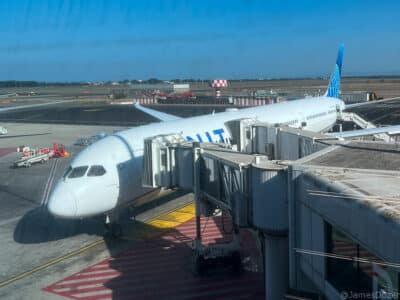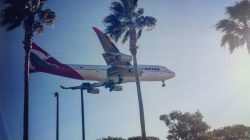The Wall Street Journal’s Middle Seat column this week described the confusion and hassle with using codeshare tickets. These are flights that are sold by one airline and operated by another. They are commonly used by alliance carriers (e.g., United Airlines selling a flight operated by Lufthansa) but can also be used by other types of partnerships.
More specifically, they are flights “marketed” by one airline and operated by another. They could be sold by a third airline or an independent party such as a travel agency. The marketing carrier is the one that puts its flight number on the schedule. But I’ll ignore this distinction. It’s common that the marketing and the selling airline are the same when, for example, you purchase an American Airlines flight on the Alaska Airlines website. Check out this post for more information on how to use ITA Matrix to find or avoid codeshares.
Scott McCartney claims that airlines have a responsibility to make this process simpler. And there’s some merit to that argument. But I still believe that the primary responsibility lies with the passenger. It’s simply wrong to spend hundreds or thousands of dollars on travel and then not do some research on the purchase. Fortunately, it doesn’t need to be as difficult as the article suggests.
Here’s an analogy to get you started: If you reserved a night at the Hilton but booked through Orbitz, you probably know that you need to sort out any cancellations with Orbitz. They have your money. But once you’re at the hotel, you’re not going to call Orbitz to get more clean towels. Hilton handles the housekeeping. Similar principles work in the airline industry. In general, the rules and policies that you need to follow will depend on which airline is responsible for fulfilling that request. They sometimes pass messages along, but your goal should be to talk to the one in charge.
Get Your Confirmation Numbers
The very first thing you should do when you book a codeshare is get the confirmation number, or “PNR” (passenger name record), for the operating airline. Every entity involved in the reservation will have its own computer systems and its own PNR. If you buy from United and fly with United, they’re obviously the same. If you buy from United and fly on Lufthansa, then they’re different. Some airlines have made it easier to find these different PNRs on your reservation page online. In most cases you will need to call the airline that sold the ticket to request them.
There’s sound logic for why you need to call the airline that sold the ticket. So far they are the only one doing business with you. If you call the airline that you’re flying on, they have no idea who you are. They can look you up if you provide your PNR, but you don’t have that yet.
Seat Assignments and Special Meals
Once you have the PNR, then you start addressing seat assignments and special meal requests. (The same principles apply to both, so I’ll just talk about seat assignments.)
Never, ever rely on the company that sold your ticket to handle seat assignments. This includes codeshare flights as well as third-party online travel agencies. All they do is pass along your request and let the operating airline deal with it. No one bothers to check back with you if your request is unsuccessful, and how would they even know? There are too many layers in this one-way communication channel.
But using the PNR for the operating airline, you can call reservations at the operating airline and request a seat assignment. You may also be able to do this online by looking up the itinerary with the PNR and your last name. If you are traveling on multiple different airlines then you will need to call all of them.
Checked and Carry-on Luggage
Luggage gets more confusing, partly because of the difference between checked and carry-on luggage. Look at it from the perspective of whom you speak with, and it becomes a little clearer.
When you check bags, any fees and policies are determined by a set of complex rules governed by the IATA. (Thanks to Hyacinthe for clarifying these in the comments.) For domestic flights, the airline that accepts the luggage is in charge. You will always check in with the airline that operates the first flight in your journey. If they have more restrictive rules on checked luggage, that’s bad luck for you. If they’re more permissive, great! Once it’s out of your hands it is the airline’s job to make sure it reaches your destination, regardless of intermediate carriers.
For international flights, the “most significant” marketing carrier sets the policies, even if you check in with someone else. The definition of significant varies. IATA defines three world regions, roughly grouped into (1) North and South America; (2) Europe, Africa, and the Middle East; and (3) Asia and Australia. The first flight that crosses between zones is deemed significant. For travel within a single zone, the first flight that crosses an international border is deemed significant.
For example, let’s imagine you purchase a flight marketed by American Airlines from Seattle to Hong Kong. The first segment is operated by Alaska Airlines from Seattle to San Francisco. The second segment is operated by Cathay Pacific from San Francisco to Hong Kong. The most significant flight is the one operated by Cathay Pacific. But if it’s an American Airlines codeshare (with an AA flight number) then American Airlines will determine the baggage policies–even though you’re never traveling on an AA-operated flight!
In summary:
- Domestic: First operating carrier
- International (same IATA zone): First marketing carrier with international flight
- International (two IATA zones): First marketing carrier to cross zones
Carrying your luggage with you is also tricky. Now it’s not just one encounter at check-in. You are going to have a different encounter with a different gate agent on every leg of your journey, so it makes sense that you will have to meet different rules for each one of theses flights. I encourage you to visit the website of every airline before you fly to read their restrictions. Better yet, ask the agent when you call to select your seats.
I didn’t say these different carry-on rules are customer friendly. Still, it’s reasonable that you are going to have to meet multiple hurdles since you are having multiple encounters with airline staff instead of just one at the beginning.
Upgrades
Don’t even try. You probably already know that upgrades are prioritized by a passenger’s importance to the airline. Expensive fares and elite status move you to the front of the queue. When you buy a codeshare, that revenue is now split between the airline operating the flight and the airline that sold the ticket. You’re delivering a lot less value, and thus your priority for an upgrade is zero.
You might normally qualify for an upgrade and find that codeshares break the system. Go back to my earlier example of an American Airlines flight booked through Alaska Airlines. If you have American AAdvantage status, but the flight has an Alaska Airlines flight number, then you’re out of luck. (A very similar principle applies to upgrades at hotels. If you book through a third-party, no upgrade for you regardless of status.)
Irregular Operations (IRROPS)
The main argument for avoiding codeshares is not for all the reasons above. The rules make sense once you think them through, and despite the extra legwork you can usually take care of everything with a couple of calls. The lack of upgrades has no workaround, but if you fly business or first class it’s a non-issue.
The real trouble doesn’t start unless the regular flight schedule gets disrupted. Again we have a conflict due to the mismatched obligations of each party to your ticket. The airline that sold you the ticket is responsible for getting you to your destination. They have essentially contracted that responsibility to another airline, yet that airline has other customers it sold to directly. Guess who gets priority?
When you deal with multiple airlines, fingers start pointing in every direction and the ability to find replacement flights can be severely hampered. My advice is to wait in line with the operating carrier to hope for assistance, but you should also call the airline that sold the ticket. Explain the situation and hope they can resolve it over the phone before you get to the front of the line.
Conclusion
In general, avoid codeshare flights whenever you can. There are some situations when the codeshare might be cheaper, but these are few. In many cases the codeshare is more expensive. If you see a codeshare you should try to book through the operating airline’s own channels. The one time a codeshare is acceptable — perhaps even unavoidable — is when no airline offers flights between two cities and a connection on different carriers is necessary. In that case, a codeshare is preferable to booking separate tickets.





